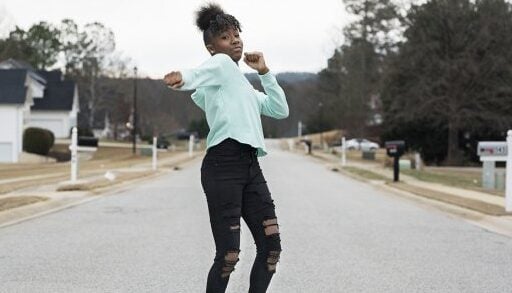Jalaiah Harmon was only 14 years old when she created one of the most viral dances on the internet posted in September 2019; but for a long time, no one knew it was hers. The young African-American dancer from Atlanta devised her own choreography to Lottery, a track by rapper K-Camp, and shared it with her 20,000 or so fans on Instagram.
In a few minutes, she had garnered no less than 13,000 views. Such was her success that people were quick to copy her ‘waves’ and ‘woah’ hip-hop moves and post their own clips on TikTok.
“I was happy when I saw my dance all over,” she told the New York Times. “But I wanted credit for it.” Jalaiah’s case is not an isolated incident.
Choreographies by black dancers are often the source of the biggest buzz on the video-sharing platform TikTok, known for its dance challenges and other more or less creative choreographies viewed thousands or even millions of times.
These record numbers often represent a financial windfall for the creators, but they are taken up by predominantly White users – who are consequently more publicised and better paid – without mentioning the original authors.
The article continues below

Free download
Get your free PDF: Top 200 banks 2019
The race to transform
Complete the form and download, for free, the highlights from The Africa Report’s Exclusive Ranking of Africa’s top 200 banks from last year. Get your free PDF by completing the following form
Invisible
Faced with this lack of recognition and visibility, the hashtag #BlackTikTokStrike was created on 19 June 2021 and has gone viral, with over 6.5 million views. Driven by 21-year-old professional dancer Erick Louis (over 337,000 followers), the movement focuses on the phenomenon of appropriation of creations.
@theericklouisIf y’all do the dance pls tag me ???? it’s my first dance on Tik tok and I don’t need nobody stealing/not crediting♬ Thot Shit – Megan Thee Stallion
It encourages the black community to stop broadcasting dance videos, thus deliberately missing out on new musical trends with a high audience potential, such as the track Thot Shit by African-American rapper Megan Thee Stallion. The aim was to show that “this platform would be nothing without black people”, the initiator of the strike said in a video posted on his TikTok account.
“We care deeply about the experience of black creators on our platform and continue to work every day to create a supportive environment for our community, while instilling a culture where honoring and crediting creators for their creative contributions is the norm,” TikTok said in a press release.
However, the phenomenon of cancel culture in the black community is not new and has gone beyond the boundaries of entertainment. At the time that George Floyd (an African-American) was killed by a White police officer in May 2020, many African-American users wanted to show their support for the Black Lives Matter movement by posting the words ‘Black, Black Lives Matter, Black support’ in their TikTok bio. This content was deemed ‘inappropriate’ and immediately deleted by the application’s algorithm.
Videos captioned with the hashtag #GeorgeFloyd and #BlackLivesMatter posted in the wake of the content were also rendered invisible, receiving no views: a technical problem that would have affected other hashtags, according to the company. In fact, these publications would have been viewed billions of times. This error prompted TikTok to pledge $3m to charities working for the black community during the Covid19 pandemic, and another $1m to fight racial injustice and inequality in the US.
